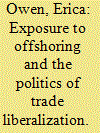| Srl | Item |
| 1 |
ID:
171279


|
|
|
|
|
| Summary/Abstract |
This research offers a post-mortem on political advertising in 2018, providing important context for 2018’s “blue wave.” In a majority of US House of Representatives races, there were more pro-Democratic than pro-Republican ads, including in the most competitive contests. The one theme that united pro-Democratic advertising was health care, which was mentioned in nearly three of every five Democratic ads in the fall campaign. Contrary to the narrative that television is declining, a record number of television ads aired in the 2018 midterms, whereas digital spending still constituted a small percentage of overall advertising spending for most candidate campaigns. Finally, there was a healthy volume of outside-group spending in 2018, with “dark-money” groups increasing their involvement—especially in support of Democratic candidates.
|
|
|
|
|
|
|
|
|
|
|
|
|
|
|
|
| 2 |
ID:
155490


|
|
|
|
|
| Summary/Abstract |
The movement of jobs overseas—known as “offshoring”—is one of the most politically charged aspects of globalization in developed countries. The high salience of offshoring reflects growth in competitive pressures from globalization that directly target individuals’ jobs. I argue that, in a world of fragmented production, how vulnerable one’s occupation is to offshoring helps explain patterns of protectionist sentiment not otherwise accounted for by existing work. I expect that the negative consequences of offshoring for workers will be particularly salient. As a result, vulnerability to offshoring is likely to generate protectionist sentiment toward free trade among constituents. Therefore, legislators whose constituents are vulnerable to offshoring should prove more likely to oppose trade liberalization. I measure vulnerability to offshoring at the district level using data from the US Census. I analyze roll call votes on free trade in the House of Representatives between 2001 and 2006. I find that the larger the share of their constituents who are vulnerable to offshoring, the more likely legislators are to vote against free trade and to discuss the costs of trade for workers in floor debates. My results suggest that the dynamics of offshoring constitute an overlooked dimension to the political economy of trade.
|
|
|
|
|
|
|
|
|
|
|
|
|
|
|
|
| 3 |
ID:
158606


|
|
|
| 4 |
ID:
111960


|
|
|
|
|
| Publication |
2012.
|
| Summary/Abstract |
In the summer of 2010, 52 Republican members of the US House of Representatives joined the newly formed Tea Party Caucus, bringing the first institutional voice to the Tea Party movement. To understand both the policy orientations of the organized Tea Party (in its caucus manifestation) and the institutional strength of the caucus's membership, we assess the extent to which caucus members are distinctive from their fellow Republicans in the US House of Representatives. Our results suggest that membership in the caucus is primarily driven by ideology and economics. Specifically, we find that Tea Party Caucus members are Republicans who are ideologically oriented toward limited government and lower taxes and who hail from particularly prosperous congressional districts. We find no evidence that Tea Party Caucus members serve safer districts or have greater seniority or institutional stature than their Republican colleagues who are not members of the caucus. These findings, we believe, speak not only to the nature and orientations of the Tea Party Caucus, but to the wider Tea Party movement itself.
|
|
|
|
|
|
|
|
|
|
|
|
|
|
|
|
| 5 |
ID:
117548


|
|
|
| 6 |
ID:
175296


|
|
|
|
|
| Summary/Abstract |
This article considers whether candidates strategically use emotional rhetoric in social media messages similar to the way that fear appeals are used strategically in televised campaign advertisements. We use a dataset of tweets issued by the campaign accounts of candidates for the US House of Representatives during the last two months of the 2018 midterm elections to determine whether candidate vulnerability predicts the presence of certain emotions in social media messages. Contrary to theoretical expectations, we find that vulnerability does not appear to inspire candidates to use more anxious language in their tweets. However, we do find evidence of a surprising relationship between sad rhetoric and vulnerability and that campaign context influences the use of other forms of negative rhetoric in tweets.
|
|
|
|
|
|
|
|
|
|
|
|
|
|
|
|